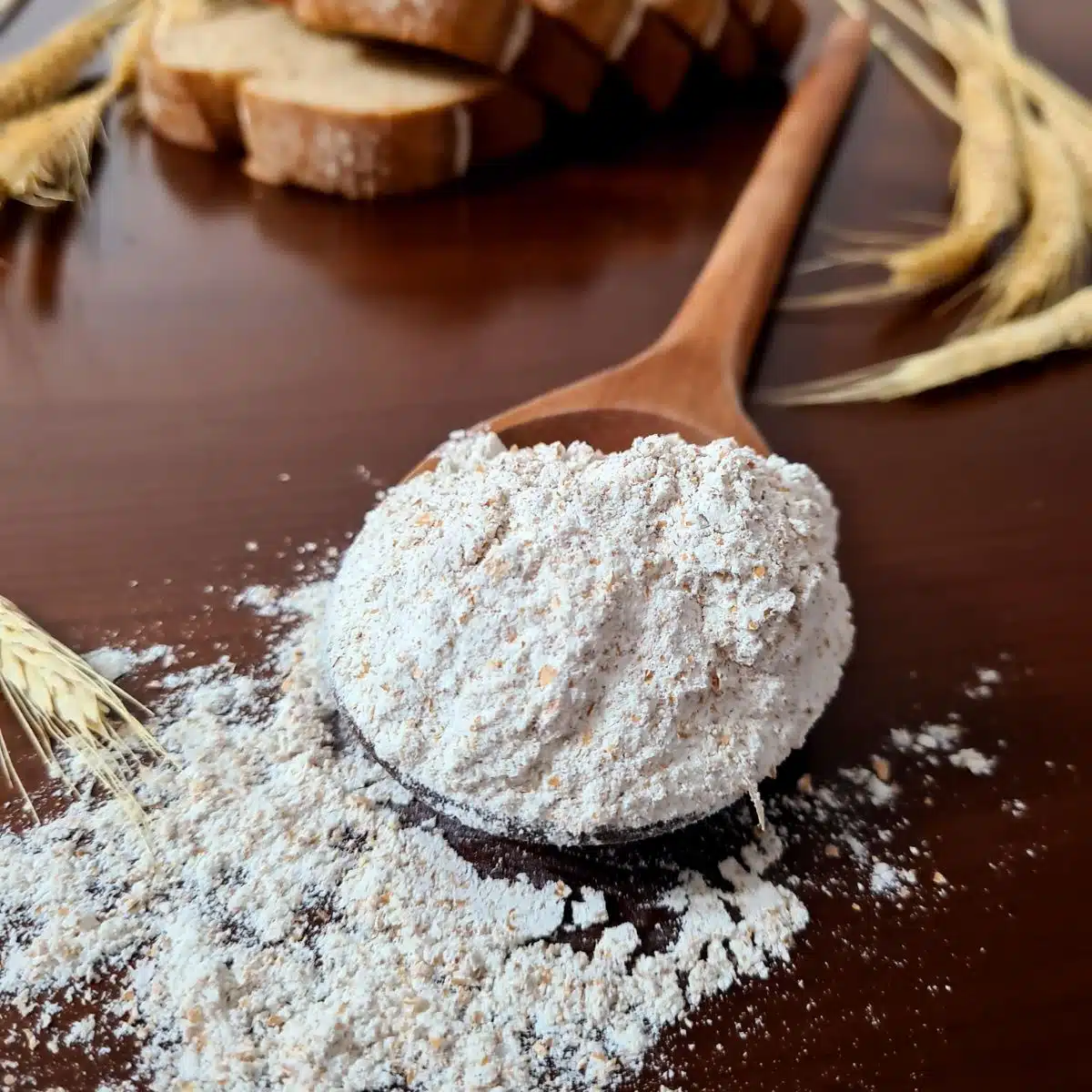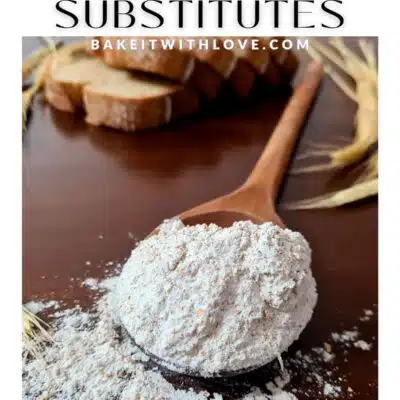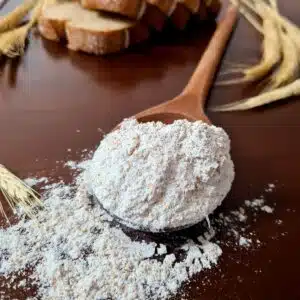A rye flour substitute isn't something you'll need often, but you never know when it might pop up while baking! If you don't have any on hand, I've gathered alternate flour types you can use in its place. You might even have a good substitute waiting in your pantry!
Best Substitutes For Rye Flour
If you love bread but have been looking for a more nutrient-dense option, then you may have recently turned to rye flour. This flour comes from a type of grass that is finely milled into flour and full of nutrients like vitamins, minerals, protein, and fiber.
While you may love rye flour it is not always available at the grocery store. Furthermore, while you may like the nutty and earthy flavor, others in the family may not. Whatever the reason may be, I have several rye flour substitutes to get you through those days you don't have this wonderful ingredient available.

Jump to:
1. Whole-wheat Flour
Whole-wheat flour is one of the easiest substitutes for rye flour. It is regularly available at most grocery stores, and it may even be one you already have at home.
Since the taste of whole wheat flour is not as distinct in flavor as rye flour, it can be a good compromise for those who like the more complex flavor of rye and those who do not love it.
In addition to being easy to find, whole-wheat flour is also the easiest to substitute for. You can use an easy 1:1 ratio in any recipe and get similar results as if you had used rye flour.
2. Buckwheat Flour
While you may not have buckwheat flour at home, this is another great alternative to rye flour. Especially if you want a gluten-free alternative.
Naturally gluten-free, buckwheat flour has a rich nutty, and earthy flavor that is bolder than whole-wheat flour. However, since buckwheat is gluten-free it will not provide the exact same texture as rye flour (or whole-wheat flour).
The lack of gluten means it will not rise the same as rye flour and will result in slightly flatter and denser baked goods. It is great for making nutrient-dense baked goods like pancakes and muffins.
Despite the lack of gluten, you can still use buckwheat in a 1:1 ratio if you do not mind the denser consistency.
3. Buckwheat Flour + All Purpose Flour
If you do not have a gluten-free allergy then mixing buckwheat flour with all-purpose flour is the best option. By adding all-purpose flour, you introduce some gluten that will act a lot like the gluten in rye flour.
The result of this combination is a less dense final product and a closer consistency to the original recipe. Therefore, it can be used to replace rye flour in bread since there will be gluten to assist in leavening.
Mix ¾ cup buckwheat flour with ¼ cup all-purpose flour to replace 1 cup rye flour in any recipe.
4. Spelt Flour
Spelt flour is one that you may not have heard of. However, if you want to try something that resembles rye flour but is slightly different, this flour is a good substitute.
Like rye flour, spelt flour has a similar nutty flavor and rich texture. In addition, like buckwheat, spelt flour is also naturally gluten-free. Since it is gluten-free it does best mixed with another flour to get the closest texture to rye flour.
If you want a fully gluten-free baked good then use this in a 1:1 ratio for things like pancakes and cookies. Expect that the overall result will be denser than with rye flour.
For those who do not need it to be gluten-free, mix it with another flour (such as whole-wheat) for a more balanced texture: ¾ cup of spelt flour + 1 cup whole-wheat (or other flour) = 1 cup rye flour.
5. Amaranth Flour
Another good gluten-free alternative to rye flour is amaranth flour. Like the others above, Amaranth flour has a similar earthy and nutty flavor to replace rye flour.
While the flavor is a good substitute, amaranth is finer than rye flour. Therefore, in addition to the lack of gluten that keeps it from rising, there will be some differences in the texture of your baked goods.
To get the most from the flavor and texture of amaranth it is best used for those quick bread-type recipes like pancakes, muffins, and cookies since it won't rise much. It can be used in a 1:1 ratio if needed.
However, as with many rye flour substitutes, the best option is to blend amaranth flour with another flour (preferably flour with gluten-like whole wheat flour). Mix ¾ amaranth flour with ¼ cup of other flour in place of 1 cup of rye flour.
6. Barley Flour
Barley flour is made from barley grain which is nutty and slightly sweet. This gives it similar qualities to rye flour. However, barley is also somewhat bitter. Therefore, some may not like it.
It is highly nutritious flour though, and complete with protein, fiber, vitamins, minerals, and even some healthy fats. This makes it a good nutritional substitute for rye flour.
Like rye flour, it does contain gluten, but it does not rise in quite the same way as rye flour. Therefore, it is still best used in a blend.
Mix ¾ cup of barley flour with ¼ cup of a different flour (whole-wheat is a good choice) to replace 1 cup of rye flour. In addition to helping as a leavening agent, the addition of a milder-tasting flour will also help cut some of the bitter taste.
7. Oat Flour
If you do not have access to the other flours suggested above then another good substitute is oat flour. While oat flour can be purchased at most health food stores it can also be made easily at home.
All you need to make oat flour at home is raw oats (aka oatmeal) and a blender or food processor. Simply toss the raw oats into the blender and blend until milled into a fine powder.
Oat flour has a softer flavor than some other substitutes but it still has an earthy tone. Since this is a milder flavor compared to rye flour it can be a good alternative for recipes you don't want to have a bold taste.
Be mindful that oats are naturally gluten-free and will not rise in the same manner as rye four. On the other hand, be cautious that many oats are processed in facilities that process wheat. Therefore, if you have a gluten allergy make sure the packaging states they are gluten-free.
While oat flour can be used in a 1:1 ratio for cookies, they are best blended with gluten flour for things like pancakes and bread. Mix ¾ cup oat flour with ¼ cup whole-wheat or all-purpose flour to replace 1 cup rye flour.
8. Rice Flour
Another good substitute with a milder flavor that is not as nutty is rice flour. Made by milling rice (white or brown) this flour is a good gluten-free alternative.
In addition, since it is popularly used around the world it can easily be found in health foods stores or online. Some mainstream grocery stores also carry it.
Along with its milder flavor, rice flour also has a softer texture than rye flour. Therefore, you will get a distinctly different outcome in your baked goods. However, if you use brown rice flour you will still get some of the richer texture that is found in rye flour.
Due to the softer texture of rice flour, it is best to mix it with course flour. You can use another gluten-free flour or any other flour.
Use ¾ rice flour + ¼ other flour to substitute for 1 cup of rye flour. This is best used for pancakes, muffins, and cookies but not for bread.
9. Kamut Flour
Kamut flour is made from Kamut which is a type of wheat that is considered an ancient grain. It has a similar chewy and nutty texture that resembles the flavor of rye which makes it a wonderful substitute.
Unlike whole-wheat flour though, Kamut is not as common to find in mainstream grocery stores. It is popularly sold in health food stores though and you can order it online.
It contains many nutrients like rye flour and can be used in the same types of recipes. However, while it can be used in a 1:1 ratio many prefer to mix it with another flour.
Consider using ¾ Kamut flour with ¼ cup of barley or spelt flour for a more complex flavor and texture to replace 1 cup of rye flour.
10. Corn Flour
Corn flour is not the ideal substitute for rye flour, but it can work. Unlike corn meal that is courser, corn flour is finely milled.
However, like oat flour, corn flour can be made by simply blending corn meal until it is finer. Therefore, making this an easy substitute if you have a canister of corn meal at home.
Just keep in mind that corn flour will provide a distinctly different flavor than rye flour. It will turn your baked goods into something more like a corn muffin or cornbread.
You can use this in a 1:1 ratio but the lack of gluten will not allow it to rise. Therefore, it is best to mix it with all-purpose flour: ¾ corn flour + ¼ cup all-purpose flour = 1 cup rye flour.
Conclusion
Whether you cannot get your hands on rye flour or want a softer flavor, any of the alternatives mentioned above will work. As with any substitute, remember that while these substitutes are great alternatives, they will not provide the exact taste and texture of rye flour.
Therefore, to get the exact result from a recipe that calls for rye flour you may need to head to the store. However, if you are ready to explore some varied flavors and textures start experimenting with the list above until you find your perfect rye flour substitute!
>>>>See all of my recipes here<<<<
I hope you found this article useful in choosing the perfect rye flour substitute to use while baking! Let me know how everything turns out in the comment section below!
Do you love a recipe you tried? Please leave a 5-star 🌟rating in the recipe card below and/or a review in the comments section further down the page.
Stay in touch with me through social media @ Pinterest, Facebook, Instagram, or Twitter! Subscribe to the newsletter today (no spam, I promise)! Don't forget to tag me when you try one of my recipes!
📖 Recipe Card
Best Rye Flour Substitute: Whole Wheat Flour (+More Easy Alternatives!)
Ingredients
- 1 cup whole wheat flour
- 1 cup buckwheat flour
- 1 cup spelt flour
(Note: 2x or 3x only changes the ingredient list)
Instructions
- Use whole wheat flour as a 1:1 substitute for rye flour to get similar results when baking.
- Use buckwheat flour in a 1:1 ratio for rye flour if you do not mind the denser consistency.
- Use spelt flour in a 1:1 ratio for things like pancakes and cookies. Expect that the overall result will be denser than with rye flour.



Marcos Antonio says
Muito bom suas instruções e orientações para substituir o centeio.
Nunca imaginei que um dia ficaria sem acesso ao meu bom e velho centeio.
Bora lá fazer os testes.
"Your instructions and guidelines for replacing rye are very good.
I never imagined that one day I would be without access to my good old rye.
Let's go and do the tests."
Anne says
Love your recommendations making it easy to make recipes without having to make a trip to the supermarket – thank you! I do want to correct an important point though (on the Rye flour substitute page: Spelt is a gluten-containing grain closely related to wheat, so it is unsafe for anyone with celiac disease – although some gluten-intolerant people find it easier to digest.– Anne